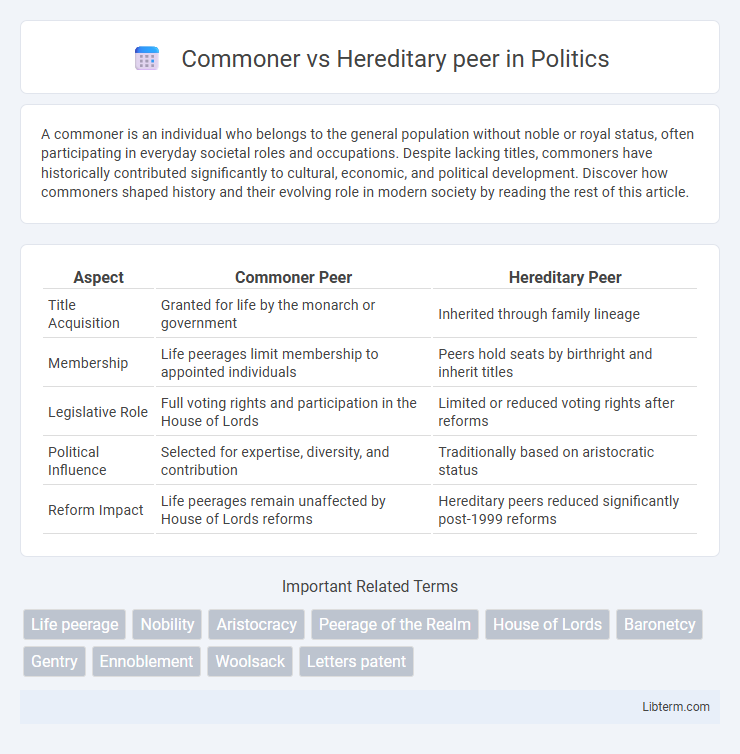A commoner is an individual who belongs to the general population without noble or royal status, often participating in everyday societal roles and occupations. Despite lacking titles, commoners have historically contributed significantly to cultural, economic, and political development. Discover how commoners shaped history and their evolving role in modern society by reading the rest of this article.
Table of Comparison
| Aspect | Commoner Peer | Hereditary Peer |
|---|---|---|
| Title Acquisition | Granted for life by the monarch or government | Inherited through family lineage |
| Membership | Life peerages limit membership to appointed individuals | Peers hold seats by birthright and inherit titles |
| Legislative Role | Full voting rights and participation in the House of Lords | Limited or reduced voting rights after reforms |
| Political Influence | Selected for expertise, diversity, and contribution | Traditionally based on aristocratic status |
| Reform Impact | Life peerages remain unaffected by House of Lords reforms | Hereditary peers reduced significantly post-1999 reforms |
Introduction to Commoners and Hereditary Peers
Commoners represent the majority of citizens in a society who do not hold noble titles or hereditary privileges, participating in governance primarily through elected positions. Hereditary peers inherit titles and seats in the aristocratic hierarchy, often granting them lifelong legislative roles and social status automatically passed down through family lineage. The distinction between commoners and hereditary peers lies in the basis of authority: merit and democracy versus birthright and tradition.
Historical Background of British Social Classes
Commoners in British history traditionally comprised the majority of the population without noble titles or inherited privileges, shaping society through commerce, trade, and local governance since the medieval period. Hereditary peers, originating from the feudal system, held aristocratic titles passed down through generations, granting them political power and landownership in the House of Lords. The evolving British social classes reflect a complex hierarchy where hereditary privilege impacted legislation and governance, while commoners gradually gained economic influence and political rights, especially after reforms like the 1832 Reform Act and the 1999 House of Lords Act.
Definition of a Commoner
A commoner is an individual who does not hold a hereditary or noble title, distinguishing them from hereditary peers who inherit their membership in the aristocracy. Commoners typically participate in democratic processes without the privileges granted by noble birthright. This distinction shapes social hierarchy and legal privileges within systems like the British peerage.
What is a Hereditary Peer?
A hereditary peer is a member of the British aristocracy who inherits their title, such as Duke, Marquess, Earl, Viscount, or Baron, through family lineage rather than being appointed. These titles traditionally grant the holder a seat in the House of Lords, although reforms have limited automatic membership to a select group of hereditary peers. Unlike commoners, who do not hold noble titles, hereditary peers often possess ancestral estates and have historically played significant roles in governance and social hierarchy.
Roles and Privileges in Society
Commoners, typically elected or appointed individuals, hold roles based on merit, expertise, or public support, actively participating in legislative and civic duties without inherited status. Hereditary peers inherit titles and privileges, often with long-standing social influence, granting them automatic seats in certain legislative bodies and traditional honors. The primary distinction lies in social authority and legislative power derived from birthright for hereditary peers, contrasting with the commoners' legitimacy from contemporary democratic processes.
Differences in Political Influence
Commoners typically have political influence through elected positions, allowing direct participation in democratic processes and accountability to voters. Hereditary peers hold political influence mainly through inherited seats in legislative bodies like the House of Lords, where their power is tied to lineage rather than election. This distinction results in commoners often having more immediate and widespread impact on policy-making, while hereditary peers exert influence through tradition and sustained presence in governance institutions.
Social Mobility Between Classes
Social mobility between commoners and hereditary peers is often limited due to entrenched class structures and inherited privileges within aristocratic systems. Hereditary peers benefit from lifelong social status, exclusive access to elite networks, and institutional power, which restrict upward mobility for commoners. Educational disparities and unequal resource distribution further reinforce barriers preventing commoners from attaining peerage or equivalent social influence.
Impact on Modern British Society
The distinction between Commoners and Hereditary Peers profoundly shapes modern British society by influencing political representation and social hierarchy. Hereditary peers, whose titles pass through generations, traditionally held seats in the House of Lords, affecting legislative processes until reforms like the House of Lords Act 1999 reduced their automatic membership. This shift has democratized governance, allowing Commoners increased participation and reflecting evolving societal values toward meritocracy and equality in Britain.
Reforms Affecting Hereditary Peers
Reforms affecting hereditary peers primarily stem from the House of Lords Act 1999, which drastically reduced their number in the UK Parliament, allowing only 92 hereditary peers to remain temporarily. This reform aimed to modernize the House of Lords by diminishing the automatic legislative role of inherited titles, shifting towards a predominantly life peer-based chamber. Subsequent proposals continue to focus on further reducing hereditary peer influence, promoting a more meritocratic and representative upper house.
Future of Social Distinctions in the UK
The future of social distinctions in the UK is increasingly shaped by the evolving roles of commoners and hereditary peers within the political and social hierarchy. Hereditary peers, whose titles pass through lineage, face diminishing influence as reforms prioritize meritocratic appointments and democratic representation in the House of Lords. Commoners, representing diverse socioeconomic backgrounds, are expected to play a more prominent role in shaping governance and cultural identity, signaling a shift towards egalitarianism and reduced hereditary privilege.
Commoner Infographic

 libterm.com
libterm.com